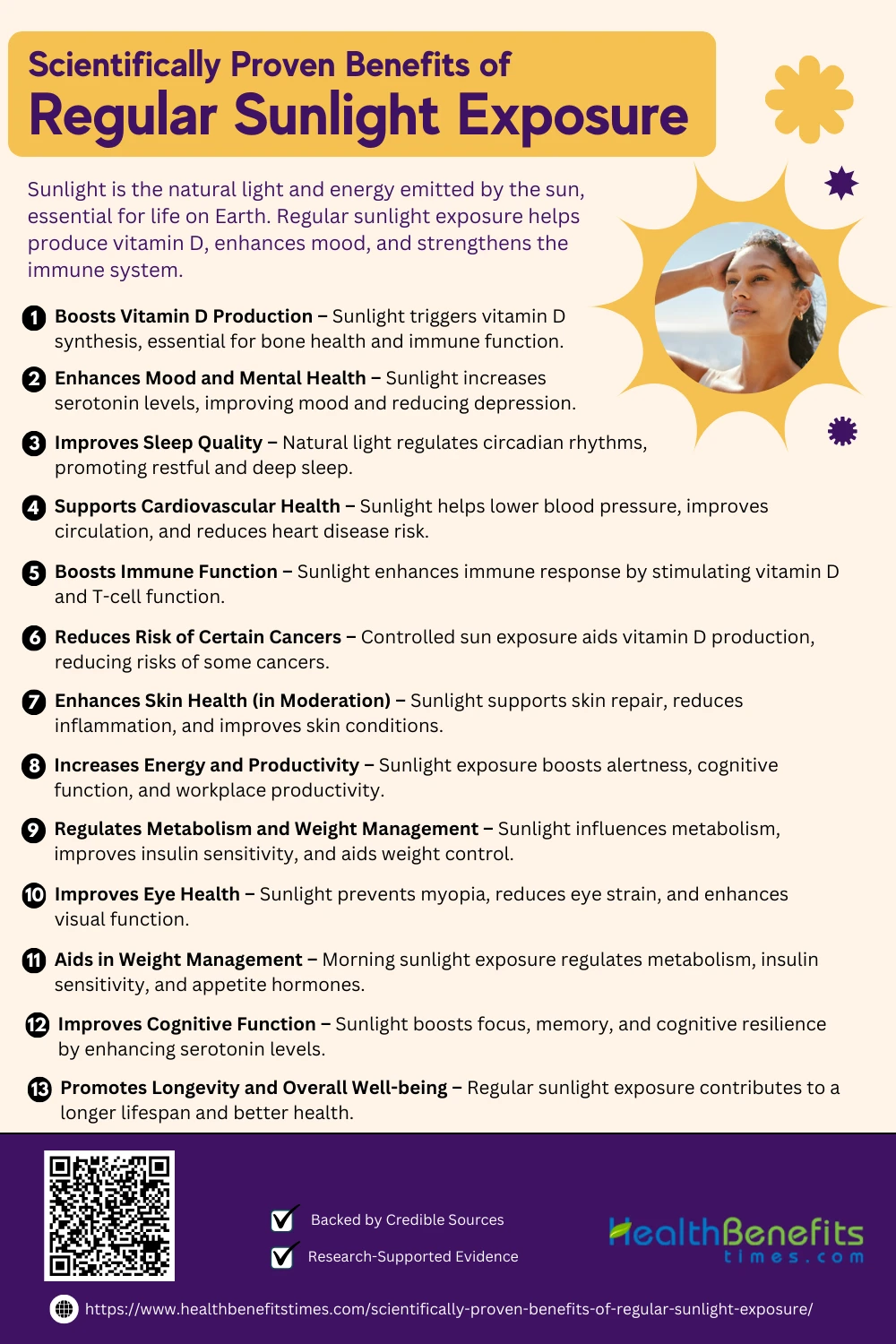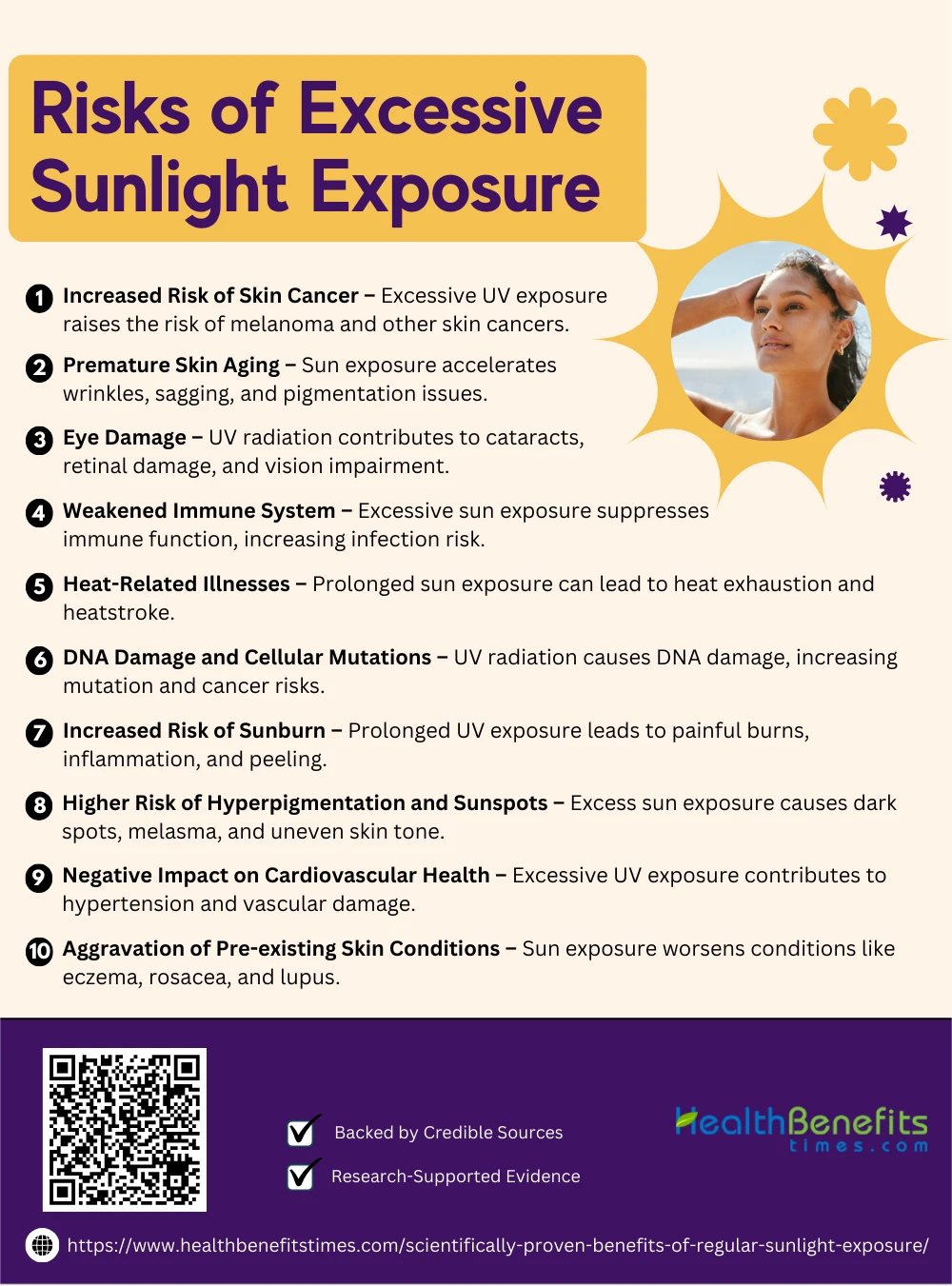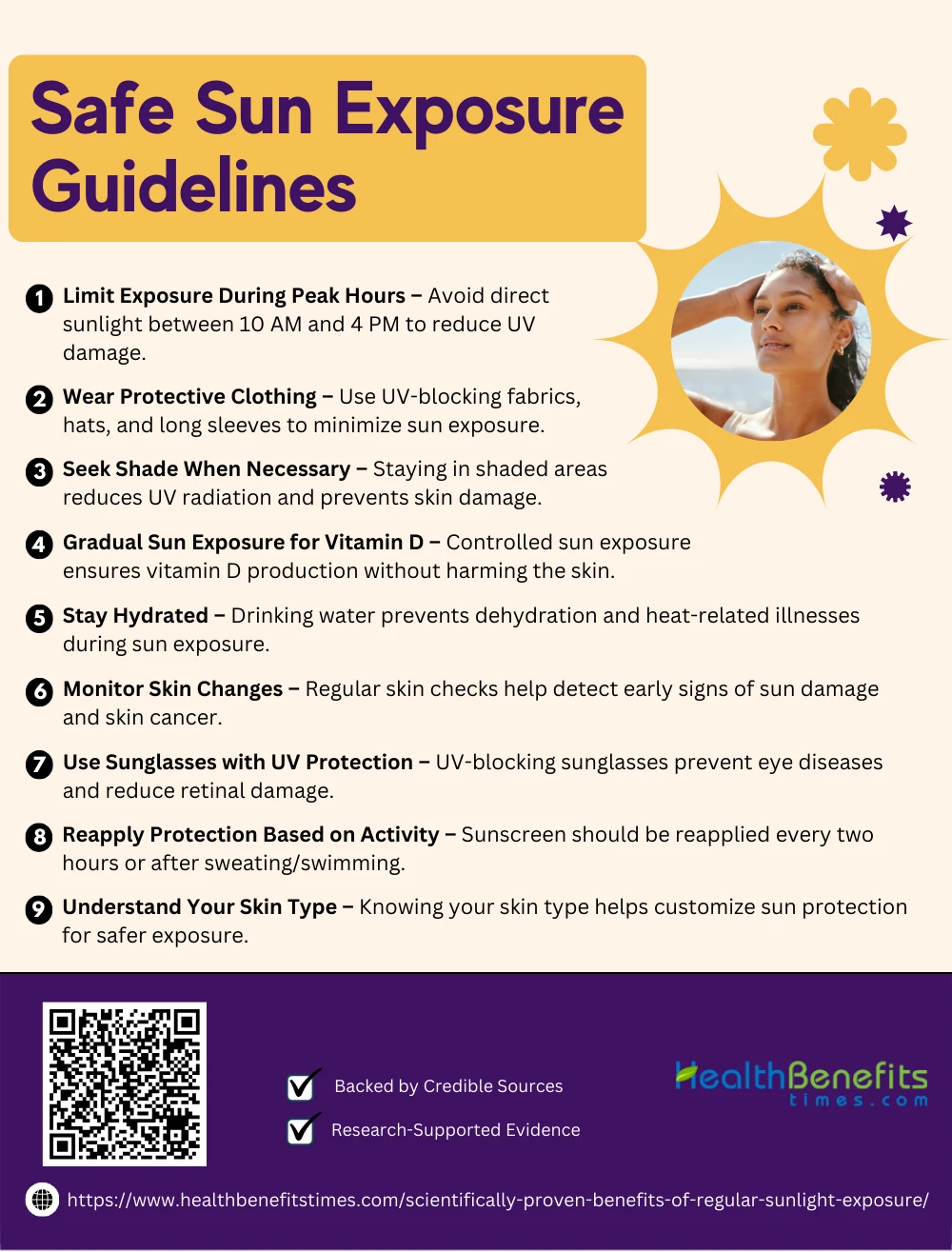- Sunlight is the natural light and energy emitted by the sun, essential for life on Earth.
- Regular sunlight exposure helps produce vitamin D, enhances mood, and strengthens the immune system.
- Sunlight regulates circadian rhythms, improves sleep quality, and contributes to overall mental and physical health.
 Sunlight is the natural light emitted by the sun, consisting of electromagnetic radiation that supports life on Earth and plays a crucial role in human health. Regular exposure to sunlight has been scientifically linked to various health benefits, including enhanced vitamin D synthesis, improved mood, and a stronger immune system. Sunlight exposure stimulates vitamin D production, which is essential for calcium absorption and bone health. It also plays a significant role in regulating circadian rhythms, which impact sleep quality and overall well-being. Additionally, moderate sunlight exposure has been associated with a reduced risk of cardiovascular diseases by promoting nitric oxide release, which helps in blood vessel dilation. Studies suggest that sunlight can improve mental health by increasing serotonin levels, reducing the risk of depression and anxiety. Moreover, controlled UV exposure has shown potential in enhancing immune function and reducing the risk of autoimmune diseases. Research also highlights the role of sunlight in metabolic regulation, with evidence suggesting that it may contribute to weight management and obesity prevention. Furthermore, exposure to natural sunlight has been associated with better skin health and reduced risks of inflammatory skin conditions. While excessive sun exposure can be harmful, responsible sunbathing habits can provide significant health advantages, making it a vital component of a healthy lifestyle.
Sunlight is the natural light emitted by the sun, consisting of electromagnetic radiation that supports life on Earth and plays a crucial role in human health. Regular exposure to sunlight has been scientifically linked to various health benefits, including enhanced vitamin D synthesis, improved mood, and a stronger immune system. Sunlight exposure stimulates vitamin D production, which is essential for calcium absorption and bone health. It also plays a significant role in regulating circadian rhythms, which impact sleep quality and overall well-being. Additionally, moderate sunlight exposure has been associated with a reduced risk of cardiovascular diseases by promoting nitric oxide release, which helps in blood vessel dilation. Studies suggest that sunlight can improve mental health by increasing serotonin levels, reducing the risk of depression and anxiety. Moreover, controlled UV exposure has shown potential in enhancing immune function and reducing the risk of autoimmune diseases. Research also highlights the role of sunlight in metabolic regulation, with evidence suggesting that it may contribute to weight management and obesity prevention. Furthermore, exposure to natural sunlight has been associated with better skin health and reduced risks of inflammatory skin conditions. While excessive sun exposure can be harmful, responsible sunbathing habits can provide significant health advantages, making it a vital component of a healthy lifestyle.
Science of Sunlight and Human Health
Sunlight plays a fundamental role in human health, influencing physiological processes such as circadian rhythm regulation and immune function enhancement. Exposure to natural light supports vitamin D synthesis, which is crucial for bone health and metabolic regulation. Furthermore, studies highlight sunlight’s role in mental well-being, as it helps boost serotonin levels, reducing depression risks. While excessive UV exposure may pose risks, controlled sunlight exposure remains vital for holistic health.
Scientifically Proven Benefits of Regular Sunlight Exposure
Sunlight is essential for maintaining overall health and well-being. Scientific research highlights numerous physiological and psychological benefits of regular exposure to natural sunlight. Here are some of the most significant benefits:
1. Boosts Vitamin D Production
Sunlight is the primary natural source of vitamin D, as ultraviolet B (UVB) rays trigger vitamin D synthesis in the skin, playing a crucial role in bone health and immune function. (1) Research indicates that people with limited sun exposure often experience vitamin D deficiency, which can contribute to various health issues. (2) Additionally, individuals with higher melanin levels may require more sunlight exposure for sufficient vitamin D production. (3) Sunlight-derived vitamin D is essential for calcium absorption, reducing the risk of osteoporosis. (4) Regular outdoor activities can help maintain optimal vitamin D levels and overall well-being. (5)
2. Enhances Mood and Mental Health
Exposure to sunlight is scientifically linked to improved mood and mental well-being due to its role in serotonin production, a neurotransmitter associated with happiness. (6) Studies show that sunlight exposure helps regulate circadian rhythms, improving sleep and reducing depression symptoms. (7) Sunlight also stimulates endorphin release, enhancing overall emotional stability. (7) Light therapy has been effective in treating Seasonal Affective Disorder (SAD), further highlighting the connection between natural light and mental health. (8) Encouraging outdoor activities and proper sun exposure can significantly contribute to a healthier mind and body. (9)
3. Improves Sleep Quality
Exposure to natural sunlight helps regulate the body’s circadian rhythm, promoting better sleep patterns and overall sleep quality. (10) Sunlight influences melatonin production, a hormone crucial for sleep-wake cycles, ensuring restful sleep. (11) Studies show that individuals with regular daylight exposure experience deeper and more restorative sleep. (12) Natural light exposure also reduces sleep disturbances linked to insomnia and irregular sleep schedules. (13) Encouraging daytime outdoor activities can help improve sleep efficiency and duration. (14)
4. Supports Cardiovascular Health
Sunlight exposure has been linked to improved cardiovascular health through its role in nitric oxide release, which helps lower blood pressure and enhance circulation. (15) Studies suggest that moderate sunlight exposure reduces the risk of heart disease by improving endothelial function and reducing arterial stiffness. (16) Additionally, vitamin D production triggered by sunlight plays a role in regulating cholesterol levels and preventing arterial plaque buildup. (10) Sunlight exposure also supports heart rate variability, which is associated with a lower risk of stroke and cardiovascular disease. (5) Maintaining balanced sun exposure can contribute to overall heart health and longevity. (6)
5. Boosts Immune Function
Exposure to sunlight plays a crucial role in enhancing immune function by stimulating vitamin D production, which is vital for immune system regulation. (17) Studies indicate that adequate sun exposure enhances T-cell function, supporting the body’s defense against infections. (18) Research suggests that sunlight-induced vitamin D can reduce inflammation and autoimmune disease risks. (19) Additionally, moderate UV exposure has shown to improve immune response in combating viral infections. (20) Maintaining a balanced level of sunlight exposure strengthens overall immunity and supports long-term health. (21)
6. Reduces Risk of Certain Cancers
Research indicates that regular sunlight exposure may reduce the risk of various cancers by promoting vitamin D synthesis, which plays a role in cell growth regulation and apoptosis. (17) A deficiency in vitamin D has been linked to increased risks of oral and colorectal cancers. (22) Studies also highlight the protective role of sunlight in reducing melanoma progression when exposure is consistent and controlled. (18) Furthermore, sunlight exposure has been associated with decreased breast cancer incidence due to its role in hormone regulation. (23) While excessive sun exposure poses risks, responsible and regular sunlight exposure contributes to cancer prevention. (24)
7. Enhances Skin Health (in Moderation)
Sunlight exposure supports skin health by stimulating vitamin D production, which plays a crucial role in skin cell growth and repair. (17) Controlled UV exposure has been shown to improve symptoms of inflammatory skin conditions such as psoriasis and eczema. (25) Additionally, sunlight helps regulate melanin production, promoting even skin tone and reducing hyperpigmentation. (26) Proper sun exposure can also boost collagen synthesis, preventing premature aging and improving skin elasticity. (18) While excessive sun exposure can cause damage, moderate sunlight remains beneficial for maintaining overall skin health. (23)
8. Increases Energy and Productivity
Natural sunlight exposure has been found to enhance energy levels and improve productivity by regulating circadian rhythms and boosting serotonin production. (27) Studies indicate that workplaces with greater access to natural light report higher employee focus and efficiency. (28) Exposure to daylight during morning hours has been linked to improved cognitive function and reduced fatigue. (29) Furthermore, sunlight exposure helps in regulating alertness and reducing stress, contributing to increased work performance. (30) Incorporating natural sunlight into daily routines can significantly enhance overall well-being and productivity. (31)
9. Regulates Metabolism and Weight Management
Sunlight exposure plays a crucial role in regulating metabolism by influencing circadian rhythms, which control energy balance and fat storage. (32) Studies suggest that exposure to morning sunlight is associated with lower body mass index (BMI) and improved insulin sensitivity. (33) Sunlight also supports mitochondrial function, enhancing the body’s ability to burn calories efficiently. (34) Furthermore, adequate sunlight exposure helps regulate appetite-controlling hormones like leptin and ghrelin, reducing the risk of overeating. (35) Incorporating regular outdoor activities can aid in maintaining a healthy weight and metabolic function (MDPI).
10. Improves Eye Health
Sunlight exposure is essential for maintaining eye health, as natural light helps regulate the production of dopamine, which prevents excessive eye elongation and reduces the risk of myopia. (36) Research suggests that children exposed to more daylight have a significantly lower incidence of nearsightedness. (18) Controlled exposure to natural light also improves circadian regulation, reducing eye strain and fatigue caused by artificial lighting. (37) Additionally, sunlight exposure enhances photostress recovery and visual contrast sensitivity, improving overall visual function. (38) However, while moderate sunlight is beneficial, proper UV protection is essential to prevent long-term retinal damage. (39)
11. Aids in Weight Management
Sunlight exposure influences metabolism and weight regulation by impacting circadian rhythms and mitochondrial function. (40) Research suggests that morning sunlight exposure is linked to lower body mass index (BMI) and enhanced fat metabolism. (41) Sunlight also regulates insulin sensitivity, reducing the risk of obesity-related disorders. (42) Additionally, studies highlight that exposure to natural light can suppress appetite and balance energy expenditure. (43) Regular outdoor activity in sunlight supports sustainable weight management and overall metabolic health. (33)
12. Improves Cognitive Function
Exposure to natural sunlight plays a vital role in enhancing cognitive function by boosting serotonin production, which improves focus and mental clarity. (44) Sunlight exposure has also been linked to better sleep quality, which supports memory retention and learning abilities. (37) Studies indicate that moderate ultraviolet B (UVB) radiation can alleviate anxiety and enhance social behaviors. (45) Additionally, daylight exposure helps maintain circadian rhythm, reducing cognitive decline in aging populations. (46) Incorporating regular sunlight exposure into daily routines promotes long-term brain health and cognitive resilience. (47)
13. Promotes Longevity and Overall Well-being
Regular exposure to sunlight has been linked to increased longevity and enhanced overall well-being through its impact on physiological and mental health. (48) Sunlight promotes vitamin D synthesis, which plays a crucial role in immune function and disease prevention. (49) Studies show that people with higher sun exposure have a lower risk of cardiovascular diseases and certain cancers, contributing to a longer lifespan. (50) Moreover, exposure to natural light regulates circadian rhythms, leading to improved sleep and reduced stress levels. (51) Incorporating moderate sun exposure into daily routines can significantly enhance both physical and mental health, promoting longevity. (52)
Risks of Excessive Sunlight Exposure
Excessive sunlight exposure can lead to serious health risks, including skin damage, premature aging, sunburn, and increased risk of skin cancer. Prolonged UV radiation also harms the eyes and weakens the immune system.
1. Increased Risk of Skin Cancer
Excessive ultraviolet (UV) radiation exposure from sunlight significantly increases the risk of developing skin cancer, including melanoma, basal cell carcinoma, and squamous cell carcinoma. (53) Studies highlight that individuals engaging in high-risk tanning behaviors are more susceptible to DNA damage leading to skin malignancies. (54) Prolonged sun exposure without protection accelerates cellular mutations, increasing cancer susceptibility. (23) Regular use of sunscreen and protective measures can help reduce this risk. (55)
2. Premature Skin Aging
Prolonged exposure to the sun accelerates premature skin aging by breaking down collagen and elastin, leading to wrinkles and sagging skin. (56) UV rays cause oxidative stress, resulting in pigmentation issues and uneven skin tone. (57) Excess sun exposure can also lead to a loss of skin moisture, making the skin more prone to dryness and rough texture. (58) Preventative measures like sunscreen and hydration can mitigate these effects. (18)
3. Eye Damage
Prolonged exposure to ultraviolet (UV) radiation from the sun can lead to severe eye conditions, including cataracts and macular degeneration. (59) High-energy blue light from sunlight also contributes to retinal damage and photokeratitis. (60) Studies show that excessive exposure can accelerate vision impairment and increase the risk of ocular diseases. (61) Protective eyewear and limited sun exposure help mitigate these risks. (62)
4. Weakened Immune System
Excessive sunlight exposure can suppress the immune system by altering white blood cell function and increasing vulnerability to infections. (63) UV radiation can trigger immune-inflammatory disorders, reducing the body’s ability to fight diseases. (64) Studies indicate that prolonged sun exposure may impair immune response by depleting essential immune cells. (65) Moderation in sun exposure is necessary to maintain a balanced immune system. (66)
5. Heat-Related Illnesses
Prolonged sun exposure can result in heat-related illnesses such as heat exhaustion and heatstroke, which occur due to the body’s inability to regulate temperature. (67) High temperatures combined with dehydration can lead to serious cardiovascular complications. (68) Military studies highlight the increased risk of heat injuries in extreme climates (PSU). Proper hydration and protective clothing can mitigate the dangers. (69)
6. DNA Damage and Cellular Mutations
Ultraviolet (UV) radiation from excessive sunlight exposure directly damages DNA, leading to mutations that can trigger skin cancer. (70) Studies show that prolonged UV exposure causes oxidative stress, accelerating cellular damage and increasing mutation risks. (71) DNA repair mechanisms can become overwhelmed, resulting in permanent genomic instability. Protective measures such as sunscreen and shade-seeking behavior are crucial to preventing such damage.
7. Increased Risk of Sunburn
Prolonged exposure to ultraviolet (UV) radiation from the sun increases the risk of sunburn, leading to skin inflammation, redness, and peeling. (53) Studies indicate that individuals with lighter skin tones are more vulnerable to severe sunburns. (72) Repeated sunburns heighten the risk of DNA damage, accelerating skin aging and increasing cancer susceptibility. (23) Proper sun protection methods, such as sunscreen and shade, can help prevent harmful effects. (73)
8. Higher Risk of Hyperpigmentation and Sunspots
Excessive sun exposure triggers overproduction of melanin, leading to hyperpigmentation conditions such as sunspots, melasma, and freckles. (74) UV radiation stimulates melanocyte activity, causing uneven skin tone and dark patches. (75) Studies suggest that repeated sun exposure without protection can worsen pigmentation disorders, making treatment challenging. (76) Sunscreen and protective clothing are effective preventive measures against sun-induced pigmentation. (77)
9. Negative Impact on Cardiovascular Health
Excessive sunlight exposure can contribute to oxidative stress, leading to vascular inflammation and increased risk of hypertension and heart disease. (78) Prolonged UV exposure is linked to arterial stiffness, reducing blood flow efficiency and increasing cardiovascular strain. Studies indicate that excess sunlight exposure can deplete nitric oxide levels, impairing vascular function (OUP). Proper sun protection and hydration are crucial in mitigating cardiovascular risks. (79)
10. Aggravation of Pre-existing Skin Conditions
Individuals with skin conditions such as eczema, rosacea, and lupus may experience worsening symptoms due to excessive sun exposure. (80) UV rays can trigger inflammatory responses, leading to flare-ups and increased skin sensitivity. (81) Studies show that prolonged sun exposure can induce hyperreactivity in individuals with pre-existing skin disorders, causing discomfort and irritation. (82) Proper sun protection and avoiding peak UV hours can help manage these conditions effectively. (83)
Safe Sun Exposure Guidelines
Practicing safe sun exposure helps protect your skin while reaping sunlight’s benefits. Use sunscreen, wear protective clothing, seek shade, and limit peak-hour sun exposure to reduce the risk of sunburn and skin damage.
1. Limit Exposure During Peak Hours
Sunlight is most intense between 10 AM and 4 PM, increasing the risk of skin damage and heat-related illnesses. Studies suggest that limiting outdoor activities during these peak hours reduces UV-related health risks. (84) Research indicates that staying indoors or in shaded areas during midday can prevent sunburn and dehydration. (85) Proper scheduling of outdoor exposure helps minimize long-term skin damage. (86)
2. Wear Protective Clothing
Wearing protective clothing, such as long-sleeved shirts, wide-brimmed hats, and UV-blocking fabrics, can significantly reduce sun damage. (87) Studies show that sun-protective clothing helps minimize skin aging and lower the risk of melanoma. (43) Additionally, UV-absorbing fabrics provide an extra layer of protection against prolonged exposure. (88)
3. Seek Shade When Necessary
Seeking shade is essential to reduce prolonged exposure to ultraviolet (UV) rays, which can lead to sunburn and skin damage. (89) Studies suggest that shaded areas significantly lower the intensity of harmful radiation, preventing premature aging and skin conditions. (90) Incorporating shade into outdoor activities can effectively minimize the risk of heat-related illnesses. (58)
4. Gradual Sun Exposure for Vitamin D
Controlled sun exposure is necessary for vitamin D synthesis while minimizing skin damage. (91) Experts recommend short daily exposure, preferably during morning or late afternoon hours, to balance vitamin D production and UV protection. (92) Gradual exposure prevents burns and ensures safe absorption of UVB rays. (93)
5. Stay Hydrated
Proper hydration is essential to prevent heat-related illnesses during sun exposure, as dehydration increases the risk of sunstroke and fatigue. (94) Drinking water regularly helps maintain body temperature and skin moisture. (95) Research suggests that electrolyte-rich fluids can further aid in replenishing lost minerals and improving endurance in hot conditions. (96)
6. Monitor Skin Changes
Regularly checking for unusual skin changes, such as moles or discoloration, helps in early detection of potential skin damage and cancers. (97) Technological advancements, including mobile apps and smart sensors, aid in tracking skin alterations over time. (98) Clinical guidelines recommend annual dermatological checkups for individuals with prolonged sun exposure.
7. Use Sunglasses with UV Protection
Wearing UV-blocking sunglasses helps prevent eye conditions like cataracts and macular degeneration caused by prolonged sun exposure. (99) Studies show that high-quality sunglasses filter harmful UV rays, reducing oxidative stress on retinal cells. (43) Ensuring proper UV protection in eyewear can significantly lower the risk of long-term ocular damage. (100)
8. Reapply Protection Based on Activity
Sunscreen effectiveness diminishes with sweat and water exposure, making frequent reapplication necessary, especially during outdoor activities. (101) Studies recommend reapplying sunscreen every two hours or after swimming to maintain protection. (102) Athletes and outdoor workers are at higher risk and should prioritize consistent sunscreen application. (103)
9. Understand Your Skin Type
Different skin types react differently to sun exposure, affecting sunburn risk and melanin production. (104) Studies suggest that individuals with lighter skin tones require stronger sun protection due to increased sensitivity to UV radiation. (97) Understanding your skin type helps tailor sun protection strategies, ensuring optimal safety while benefiting from sun exposure. (105)
Conclusion
Regular sunlight exposure, when practiced safely, offers numerous scientifically proven benefits, including vitamin D production, improved mood, better sleep, and enhanced immune function. It supports bone health, reduces stress, and may lower the risk of certain diseases. However, moderation is key to avoiding harmful effects like sunburn and premature aging. By following safe sun exposure guidelines, you can maximize its health benefits while minimizing risks, ensuring a balanced approach to enjoying the sun responsibly.




